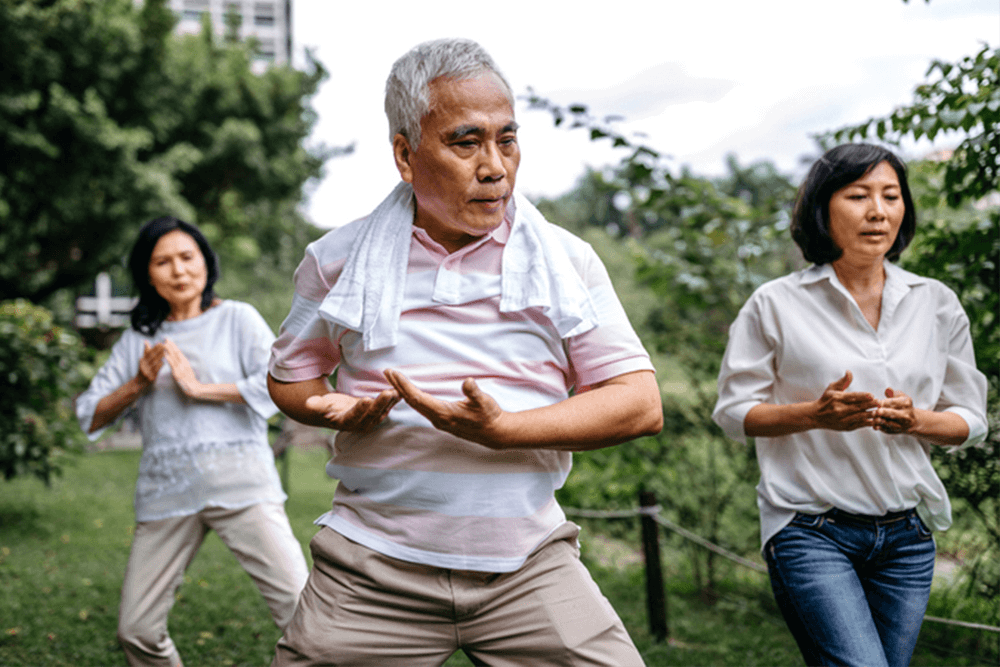As we age, stiff limbs and other health issues may make it seem impossible to remain physically active.
Regardless of your age and level of fitness, tai chi is a great way to improve your strength, balance, and flexibility. Here’s what you need to know about this millennial-old practice.
What is tai chi?
Originally, tai chi was developed as a martial art. It’s now mainly taught as a non-impact exercise that helps improve posture and alignment through slow, carefully choreographed movements.
What are the benefits of tai chi for seniors?
Tai chi doesn’t require any special equipment. All actions are repetitive, which makes it easy to learn. Seniors with mobility issues find it especially appealing since it focuses on breathing and doesn’t require intense physical exertion.
Here are some of tai chi’s biggest health benefits.
- Improves cardiovascular health
Even if the movements are slow, tai chi can have a significant impact on your cardiovascular health. It has been proven that regular practice can lower blood pressure and strengthen the heart.
- Heightens the mood
Any type of exercise will have a positive impact on your mood. However, tai chi is especially beneficial for symptoms of depression and anxiety. Tai chi practitioners learn to take slow and mindful breaths while controlling their movements. This has a calming effect on the nervous system.
- Helps prevent falls and fractures
Experts agree that tai chi improves balance and muscle strength by targeting the muscles that are required to remain upright. Among other things, it improves leg strength, flexibility, reflexes, and range of motion. This lowers the risk of suffering from falls and fractures.
In a study by Emory University, researchers found that tai chi may help reduce falls by up to 40 percent.
- Improves natural immunity
Our natural immunity wanes as we age. This is another area where tai chi can help.
The American Journal of Health Promotion has noted improvements in the body’s ability to fight certain diseases after tai chi exercise. For instance, a person’s immune-related blood markers rise. In time, bone density increases as well. This is especially beneficial for older women with osteoporosis.
- Helps you sleep better
Recent studies have demonstrated that practicing tai chi for 1.5–3 hours per week significantly improved sleep quality in healthy older adults with moderate sleep concerns. However, studies also note that in more serious cases, treatment of late-life insomnia is better achieved and sustained by cognitive behavioral therapies.
- Increases cognitive function
Tai chi has numerous physical health benefits, but it can also improve mental and cognitive health.
Studies have shown significant improvement in seniors’ cognitive capacities after only six weeks of exercise. According to researchers at McMaster University, tai chi improved executive function in healthy older adults “whether compared to no intervention (large effect) or other exercise such as walking (moderate effect).”
Tai Chi also improved cognitive function when compared to other active interventions such as exercise, cognitive behavioral therapy, and mah-jong.
Getting started with tai chi
Tai chi is gaining popularity in senior centers and health clubs across the country. The movements are slow and gentle, which makes it a perfect activity for seniors who are looking for a fun way to get in shape.
To get started, look for experienced instructors in your area, and remember that learning tai chi requires patience – like all good things in life, it can’t be rushed.
Tai chi is a component of The Atrium at Navesink Harbor’s award-winning senior wellness program—LivWell. More than just an activity program, LivWell is a wellness living program that focuses on whole-person wellness. Contact us to find out more.



